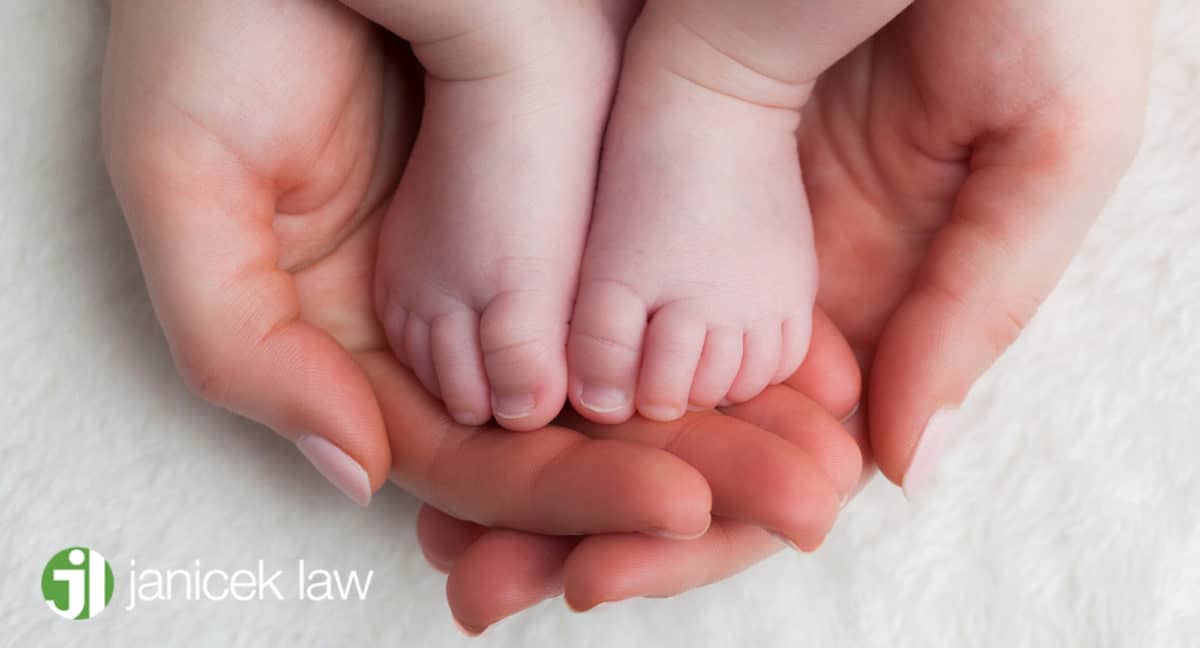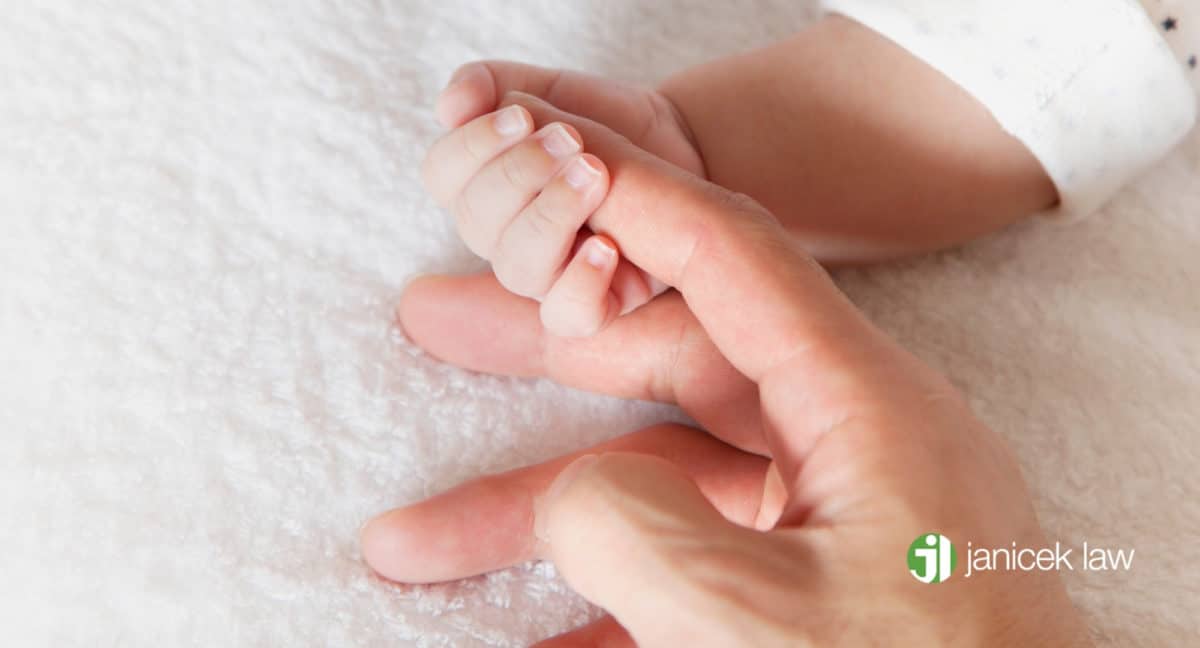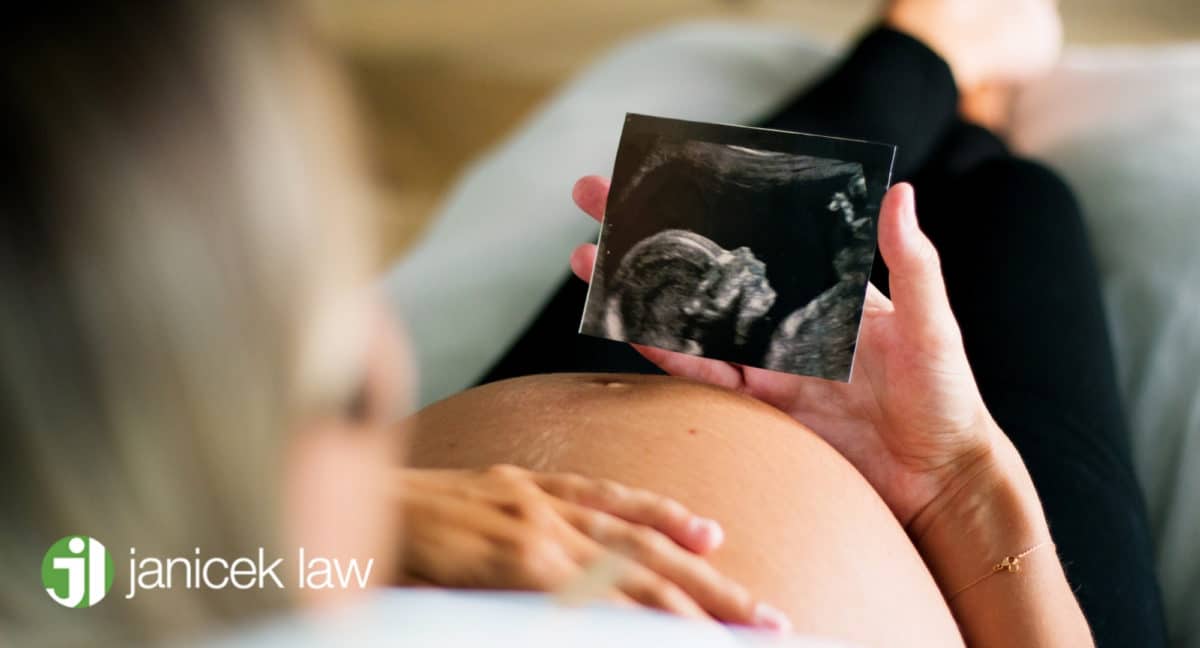San Antonio HIE Lawyer
Hypoxic Ischemic Encephalopathy Attorney San Antonio
Childbirth is simultaneously a beautiful and terrifying event. Thanks to modern medicine and technology, most babies are brought into the world unscathed. However, modern medicine is still very imperfect. Even the most skilled doctors are imperfect as well. The most minor mistakes during labor and delivery can result in major birth injuries for both mom and baby. One of the many birth injuries that a baby can suffer from is hypoxic-ischemic encephalopathy (HIE) which can lead to long-term disabilities and thousands of dollars in medical bills.
No family should have to bear the psychological pain and medical debt that comes with birth injuries. That’s why the legal team at Janicek Law in San Antonio, TX, is so passionate about fighting for victims of medical malpractice. To begin your attorney-client relationship with HIE birth injury attorneys in San Antonio, call 210-366-4949 today.

What is Hypoxic Ischemic Encephalopathy (HIE)?
Hypoxic-ischemic encephalopathy (HIE) is basically a type of traumatic brain injury that occurs during childbirth. The best way to understand the birth injury is to break down the medical term into its definitions. Hypoxia means that oxygen circulation is interrupted while ischemia means that blood flow is restricted. Lastly, encephalopathy is a medical term that describes brain dysfunction from a virus or health condition. So hypoxic-ischemic encephalopathy happens when oxygen circulation and blood flow are restricted to the brain during birth, therefore causing brain damage.
What Causes HIE?
As previously stated, HIE is caused by oxygen deprivation and lack of blood flow to the baby’s brain. More specifically, fetal distress, high-risk pregnancies, and delivery complications can cause this type of brain injury.
High-Risk Pregnancies
Certain conditions create a higher risk pregnancy such as gestational diabetes and pre-eclampsia. If these conditions aren’t closely monitored and taken care of by doctors, the mother and baby could suffer serious health consequences. One of the potential outcomes is HIE.
Umbilical Cord Complications
The umbilical cord is basically responsible for giving the baby enough oxygen while it’s in the womb. If this umbilical cord is crushed during pregnancy or birth, the baby could suffer birth asphyxia, therefore raising the baby’s risk of developing HIE.
Complications With the Placenta and Uterus
The placenta and the uterus do a lot of things to keep the baby safe and alive. One of those things is providing enough blood flow to the baby during pregnancy and birth. The placental and uterine complications listed below can lead to HIE.
- Placental Abruption occurs when the placenta detaches from the uterus while the baby is still in the womb.
- Placenta Previa ocurrs when the placenta sits way too close to the cervix. If this condition isn’t monitored closely, the mother could suffer major bleeding while the baby suffers oxygen deprivation.
- Placental Insufficiency occurs when the baby doesn’t receive enough blood flow from the placenta.
- Uterine Rupture occurs when the uterus partially or completely tears.
Serious Infections
If the mother develops a serious infection, such as an STI or bacterial vaginosis, she could pass it to the baby during birth. This can happen if the doctors fail to diagnose the mother’s infection and control it with antibiotics beforehand.
Prolonged Labor
If HIE occurs because a doctor allows labor to go on for too long, mothers have grounds to file a medical malpractice lawsuit. Prolonged labor is incredibly physically stressful for both mother and baby. If a doctor doesn’t intervene with a C-section, both mother and baby could suffer life-threatening birth injuries.
Very Low Blood Pressure or High Blood Pressure in the Mother
Maternal blood pressure abnormalities can directly affect how much blood the baby gets through the placenta. If the mother’s blood pressure is gone unmonitored and untreated, her baby could suffer perinatal hypoxic-ischemic encephalopathy (HIE). Additionally, a 2004 study suggests that maternal blood pressure abnormalities can lead to low birth weight and perinatal death.
Mismanaged Neonatal Conditions
In some cases, health conditions in the baby’s first month of life (AKA the neonatal period) can lead to neonatal hypoxic-ischemic encephalopathy, especially if these health conditions aren’t properly handled by the child’s doctor. If your baby suffered respiratory issues, hypoglycemia, or even jaundice that may have led to neonatal encephalopathy, you could file a medical malpractice lawsuit with the team at Janicek Law.
Failure to Monitor the Baby’s Heart Rate During Labor and Delivery
During labor and delivery, it’s crucial for doctors to keep an eye on the baby’s heart rate for signs of fetal distress. Fetal distress can indicate that the baby isn’t receiving enough oxygen or blood, which can lead to perinatal HIE. In some cases, emergency C-sections are necessary to save the baby. If your baby suffered brain damage because your doctor failed to monitor its heart rate, you could sue for medical malpractice.
Premature Birth
Premature babies are at risk for several long-term health conditions, including HIE because of their underdeveloped lungs. That’s why it’s crucial for doctors to do everything they can to prevent premature birth. But if premature birth is unavoidable, doctors must provide adequate medical care to babies in the NICU in order to prevent brain damage.
Can HIE Cause Cerebral Palsy?
Yes, HIE can cause cerebral palsy in babies. Cerebral palsy is basically brain damage or abnormal brain development that causes lifelong cognitive and neurological disabilities. If a baby suffers from a lack of oxygen or blood for too long, their brain cells can die and lead to a brain injury. This, in turn, can cause cerebral palsy.
How Often Does Hypoxic-Ischemic Encephalopathy (HIE) Occur in Babies?
According to a 2011 study, hypoxic-ischaemic encephalopathy is a rare but very serious brain injury. It only happens in 1.5 to 2.5 per 1,000 births. Additionally, the same study suggests that up to 60% of HIE babies will either die or have serious neurological disabilities by the time they’re 2 years old. Those who survive past two years old often struggle with lifelong mental retardation.

HIE Symptoms
A child’s HIE symptoms will naturally depend on the severity of their brain damage. Symptoms range from excessive fussiness to long-term disabilities and cognitive impairment. Babies can suffer from mild, moderate, or severe HIE.
Mild HIE is the easiest to manage and can even resolve with minimal medical treatment. Symptoms include:
- Abnormal muscular stiffness and tendon reflexes
- Feeding problems
- Excessive crying, sleeping, and irritability
Moderate HIE symptoms include:
- Floppy baby syndrome, which basically means that the baby lacks muscle tone in the whole body
- No reflexes or ability to grasp objects
- Difficulty sucking on bottles or breasts
- Seizure activity
- Breathing that sporadically starts and stops
Severe HIE
In severe cases of HIE, babies will likely suffer from:
- Extreme, frequent seizures
- Extremely poor muscle tone which causes the baby to move like a rag doll
- No response to sensory stimuli such as touch, pain, smells, sights, and sounds
- Odd eye movements or dilated pupils
- Breathing, blood pressure, and heart malfunctions which are often fatal
HIE Treatment
The best treatment for brain damage in the postnatal period is cooling therapy – also called therapeutic hypothermia – which lowers the infant’s body temperature and slows the metabolic rate. If the cooling treatment is successful, it can prevent further brain cell death and injury. The cooling period generally lasts for about 72 hours. In addition to therapeutic hypothermia, doctors must do what they can to prevent seizures, low blood sugar, and brain swelling, all of which could cause more severe brain damage.
It’s important to note that hypothermia treatment doesn’t reverse HIE because it’s a permanent injury. However, lowering the baby’s temperature could create less brain injury and, therefore, less disability later in life.
Those who have suffered moderate to severe HIE will likely need therapy and medication for their whole lives, especially if they later develop cerebral palsy. Because cerebral palsy sufferers frequently suffer from speech and mobility issues, it’s necessary for them to undergo physical therapy and speech therapy for the best possible quality of life.

San Antonio HIE Attorney
If you or your baby has suffered any kind of birth injury due to medical negligence, you deserve justice. The medical bills associated with brain dysfunction are massive and can affect your whole family. That’s why HIE birth injury attorneys at Janicek Law are so passionate about fighting for babies born with brain damage. No amount of compensation will take away the physical and mental pain of a birth injury, but it could provide closure while allowing your baby and your family to live more comfortably. Let us help you. Call 210-366-4949 for a free consultation.
